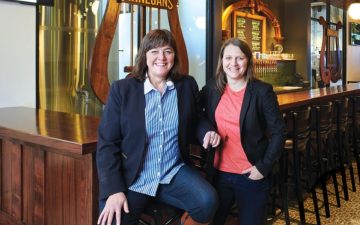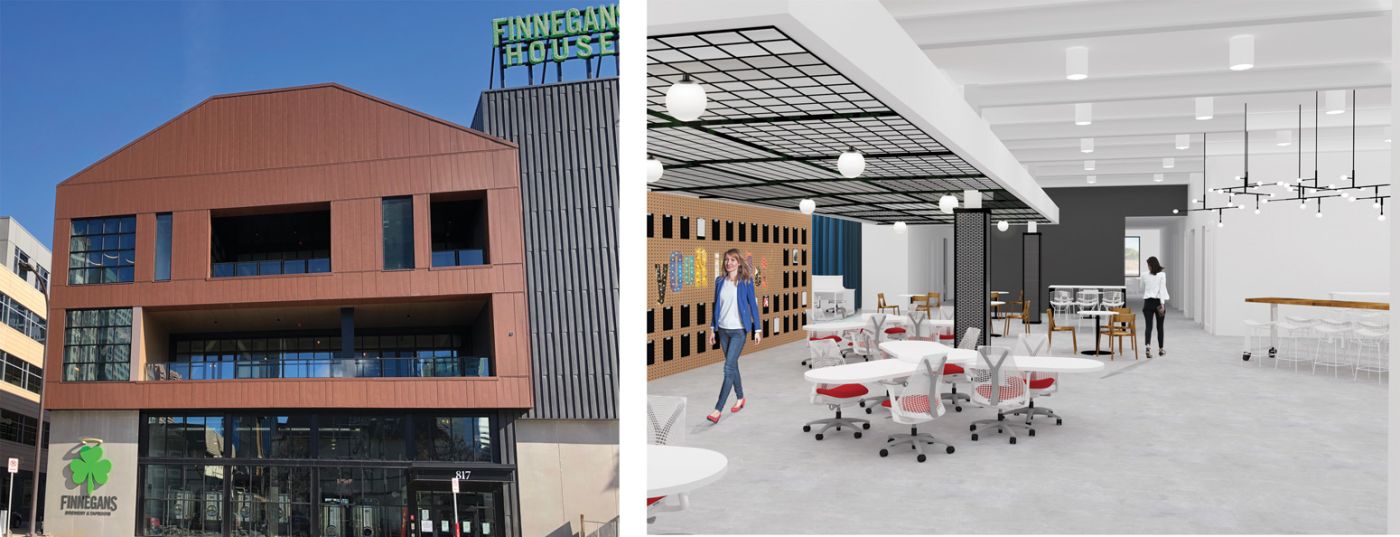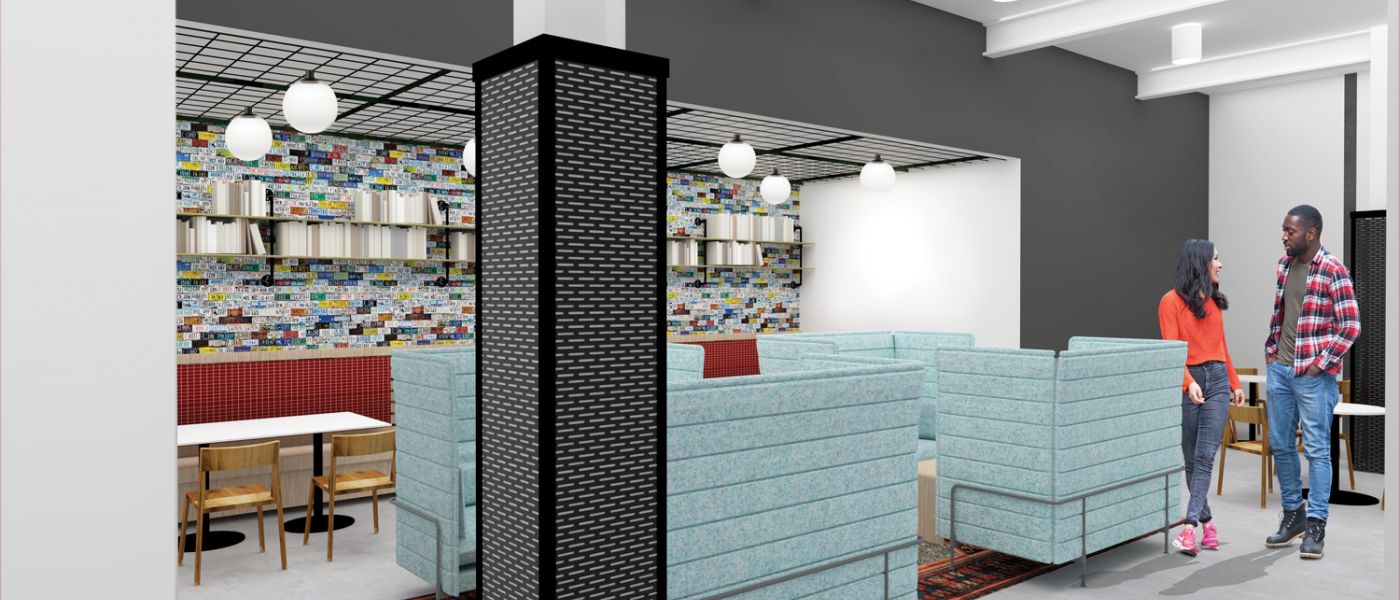Story
Creating Social Impact, One Business at a Time
How FINNovation Lab + Impact Hub MSP are changing the landscape of social entrepreneurship

Jacquie Berglund (BF’14) keeps several hardhats around her small office on the edge of downtown Minneapolis. Co-founder of Finnegans, the first beer company in the world to donate 100 percent of its profits ($1 million to date) to charity, Berglund grabs one several times a day and heads three blocks to the construction site where her next big idea is taking shape. When it fully opens in late spring of 2018, Finnegans House will feature a brewery and taproom as well as a social business incubator and accelerator. The expanded space and mission are the result of a collaboration with Impact Hub MSP and promise to change the landscape of social entrepreneurship in the Twin Cities.
When Berglund started Finnegans in 2000, it was one of the only social businesses in the country. She used the proceeds from beer sales to buy produce from local farmers, which she then donated to food shelves. She soon started looking for ways to broaden the conversation around the impact businesses have on communities and the environment. She received a Bush Fellowship in 2014 to expand and build support for other social entrepreneurs in the Twin Cities. Fast forward to 2017, when Berglund and Mary Rick, a co-founder of Impact Hub MSP and the current CEO of FINNovation Lab + Impact Hub MSP, are finalizing programming, budgets, design of the new Finnegans House building, and dealing with the frustrations that always come with construction. One cold November week, it was an electrical wiring problem in the new building that had Berglund dashing between Finnegans and the construction site.

FINNovation Lab + Impact Hub MSP — or “the Collaboration,” as the two organizations affectionately call it — officially came together in 2017, when Rick was named CEO by a Joint Governance Board that is guiding the new alliance. Prior to joining the Impact Hub, Rick worked for six years as director of sales for Peace Coffee, a local fair-trade social business, where she strove to convince consumers that ethically sourced coffee must become mainstream. To Rick, ensuring the health and safety of underpaid coffee growers and the environment was integral to the success of Peace Coffee. Soon after a friend introduced them, while Rick still worked at Peace Coffee, Berglund and Rick realized they shared a goal of growing an economy that cares not just about the bottom line, but also about positively affecting the people who help create the product, the environment and consumers.
Other than Rick and Berglund, collaborators include current Impact Hub members, Finnegans fans, food charities, programming partners, volunteers, social entrepreneurs and funders (including the Bush Foundation). While Berglund runs Finnegans, Rick leads Strategy and Innovation for the Collaboration. She meets regularly with collaborators to develop programming that will help social entrepreneurs start and grow their businesses.
Once complete, their shared vision will be a modern, four-story, 44,160-square-foot building housing a production brewery and taproom on the first floor and the Brewer’s Den on the mezzanine, a social club where dues-paying Finnegans fans can try new beer recipes and attend monthly curated events for their professional and artistic growth. Seventy-five percent of the club’s membership dues will be tax deductible and will support charitable efforts by the Finnegans Community Fund. The third floor will feature commercial office space for rent, and the fourth will be the physical site of the new collaboration. At the Collaboration, social entrepreneurs will have an entire floor equipped with space to connect, learn and work. Income generated from the Brewer’s Den will help fund programming and workspace for emerging and established social businesses, which struggle to succeed in an economy that is built for for-profit models. “Berglund is a strong visionary and knows what impact she wants to have,” explains John Sankara, who is on the Board of Directors at Impact Hub MSP.
Social Business Values
Rick traces her interest in social businesses to her upbringing in rural Minnesota, where she learned to love and care for the open land and the people who depend on it. At the University of Minnesota, her studies in international relations and economics led her to Kenya, where she participated in a program focused on international development. Later, Rick was impressed by the number of social businesses she found in the San Francisco Bay Area, where she lived for 10 years.
These varied experiences led to Rick’s conviction that capital must benefit the environment and people in order to be truly valuable. “The tools of business are the ones that I’ve come to, more and more, to solve social and environmental issues. I work through business structures to solve different world challenges.”
Many entrepreneurs, including Berglund and Rick, use the metaphor of an “ecosystem” to describe the kind of impact the Collaboration wants to have on social businesses. By fostering natural connections between socially-conscious entrepreneurs, Berglund, Rick and their collaborators hope to encourage the growth of social businesses and thereby facilitate positive change outside of the business world.
Social businesses are visionary because they care about the community and the natural resources behind a product and seek to decrease the negative effects of traditional business, like contributing to climate change, widening the gap between upper and working classes, and furthering racial divides.
The Collaboration believes that local communities are key to solving these large-scale problems. This is why the Collaboration prioritizes investment in local talent and believes that a stronger future must include social entrepreneurs from every culture, religion and background. We want “a good quality of life for every Minnesotan. We have the talent, vision and fantastic philanthropic community here,” says Susan Hammel, CEO of Cogent Consulting and a collaborator.
Berglund remembers the uncertainty and hope she felt when she first started Finnegans, and the people who supported her along the way. Through its Social Business Ventures initiative, the Bush Foundation supports visionaries like Berglund and Rick by offering financial support to get started.
Allison Barmann, who oversees the Social Business Ventures initiative at the Bush Foundation, also believes it’s important for businesses to care about social change, partly because they wield so much money and decision-making power. “We need the business sector’s support to solve pressing problems in our region. We need every sector of the economy really intentionally working on these issues.”

What They Do
As construction of Finnegans House nears completion, Rick is developing programming for the Collaboration. In addition to providing a space where social entrepreneurs can gather on their own, Rick plans to establish workshops, fellowships, lecture series and other programs to give social entrepreneurs access to the education and funding they need to develop their businesses. The Social Business Fellowship will be “an incredible opportunity for aspiring social entrepreneurs to advance their ideas and address a social or environmental need,” says Rick. Another program, the Impact Investing Community Curation, is a collaboration between Impact Hub MSP and Cogent Consulting. Their goal is to map and activate the impact investing ecosystem in the Twin Cities. With support from the Bush Foundation, this program formed the Ecosystem Project to scale and mainstream impact investing activity in the Twin Cities. They mapped and convened the ecosystem in the first year, and are currently amplifying their impact by including more participants, deepening their relationship with existing collaborators and increasing access to the ecosystem.
Rick and St. Paul-based Neighborhood Development Center (NDC) are launching the Neighborhood Development Program to serve residents and business leaders of the Elliot Park neighborhood. The NDC focuses on place-based economic support by offering trainings on business development and real estate to community members. Though still in the early planning stages, Rick’s main goal with the Neighborhood Development Program is to ensure that the construction of Finnegans House brings positive change to Elliot Park, a historically disadvantaged community.
Berglund has collaborated with the NDC since she opened Finnegans, which is also located in Elliot Park. Soon after opening, Berglund offered her Finnegans office for NDC-led training sessions to benefit local business leaders. Berglund didn’t train local business leaders at that point; she instead used the shared space to build relationships with local residents and gain ideas on how the eventual Collaboration should benefit them. Having a physical space where social entrepreneurs can gather to meet, share ideas and attend programs is helpful in “accelerating the volume of interactions” between people who might not otherwise meet, explains Sankara.
Berglund, Rick and their fellow collaborators understand that designing a welcoming, thoughtful space is crucial to creating an incubator where socially-minded entrepreneurs from different cultural, religious and economic backgrounds can come together to dream, plan and grow their social businesses. A thoughtful design will “allow for more deliberate and structured interaction,” according to Sankara.

Sankara and Lori Most, another collaborator and founder of BinaryBridge, have attended numerous roundtable meetings with other collaborators where they discuss the layout and spacing of the Collaboration. Most envisions private spaces to take calls, separate spaces to collaborate and hold in-person conversations, and access to common services for social entrepreneurs, like law firms or financial services. These conversations are still occurring, as Berglund and Rick work with designers to create a space that reflects everyone’s needs and wants. “We’re asking for the world, and the Collaboration is listening and accommodating,” Most says.
Berglund, Rick and the collaborators want to provide the practical amenities that many social entrepreneurs need, but cannot afford. “A physical space is a catalyst for more visibility and action,” according to Rick.
As plans continue to unfold, Finnegans House is set for a phased opening, with the brewery open on St. Patrick’s Day 2018, and the event space and the Collaboration opening late spring 2018.
Though the Collaboration is young, Berglund, Rick and the hundreds of others involved believe they can foster change by creating a thoughtful space and innovative programming to support all social entrepreneurs. Every person involved wants to create solutions for the world’s most pressing problems, and the Collaboration, through its physical space, programming and sense of community, plans to foster this hope for decades to come.
Continue reading
-

Story
Initiating changemakers
How the Initiators Fellowship supports business enterprises that prioritize social and environmental good throughout Greater Minnesota.
-

Note from Jen
Note from Jen: Acknowledging and learning from the boarding school era
The Bush Foundation was invited to the gathering at Gila River...
-

News
Meet the 2024 Bush Prize winners!
Bush Prize winners are doing big things in partnership with their communities.